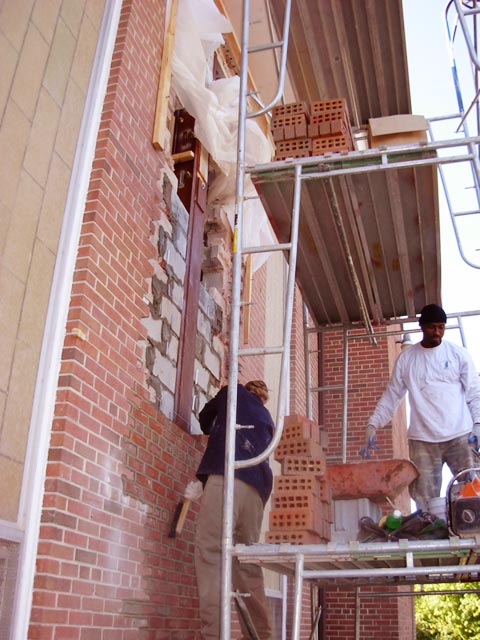Expert Step Repair Services: Guarantee Safety And Security and Toughness
Expert Step Repair Services: Guarantee Safety And Security and Toughness
Blog Article
Unlocking the Secrets of Lasting Stonework Building Practices for Eco-Friendly Buildings
In the realm of modern-day building, the pursuit of lasting methods has become extremely important. Amongst the myriad techniques to green structure, sustainable stonework building stands apart as a time-tested and resilient method that holds a wide range of untapped possibility. From the option of products to ingenious building strategies, the tricks to achieving sustainability within stonework construction are complex and appealing. By exploring the advantages, products, methods, and future fads of sustainable stonework, a much deeper understanding of exactly how these techniques can shape the future of environmentally friendly structures emerges.
Benefits of Sustainable Stonework Construction
Welcoming lasting stonework building methods not only decreases environmental impact yet additionally uses long-lasting financial advantages to building contractors and areas. By using materials like recycled bricks, obstructs, and stones, contractors can significantly lower the carbon impact of their jobs while promoting source performance. Furthermore, sustainable stonework building strategies, such as proper insulation and thermal mass residential properties, can improve energy efficiency within buildings, leading to minimized operational prices with time.
Additionally, the toughness and resilience of masonry frameworks add to lasting economic advantages. Buildings created using lasting stonework practices usually need much less repair and maintenance, equating to set you back savings for builders and home proprietors. The longevity of stonework products additionally makes certain that frameworks remain secure and safe, reducing the requirement for constant remodellings or substitutes.
Eco-Friendly Stonework Materials
Making use of environment-friendly stonework materials is an essential action towards improving the sustainability of building and construction techniques and decreasing environmental impact while making the most of long-lasting financial advantages. Lasting masonry materials are sourced, generated, and utilized in a manner that minimizes total ecological influence. Products such as recycled bricks, reclaimed rock, and lasting cinder block are becoming increasingly prominent options for eco-conscious building contractors. Recycled bricks, as an example, not only draw away waste from landfills but also require less energy to produce compared to new blocks. Recovered stone offers an unique aesthetic allure while reducing the need for brand-new quarrying. Lasting concrete blocks integrate recycled aggregates and may include better insulation residential properties, adding to energy efficiency in buildings.
In addition, natural materials like adobe, rammed planet, and straw bundles provide superb thermal mass properties, decreasing the need for home heating and cooling power. These materials are often locally available, promoting local economic situations and decreasing transportation-related carbon exhausts. By selecting environmentally friendly stonework products, building tasks can dramatically reduce their environmental impact and add to the creation of much healthier, much more lasting built atmospheres.
Energy-Efficient Stonework Techniques
Power efficiency plays a vital duty in enhancing the sustainability of masonry construction methods. One essential energy-efficient masonry method is the use of thermal mass, which includes integrating thick products like concrete or block right into the building's structure to take in and keep site here warm.

Technologies in Sustainable Masonry
Recent developments in lasting stonework techniques have brought around innovative strategies that are reshaping the building industry. One such innovation is the advancement of self-healing concrete, which utilizes germs installed within the concrete to recover fractures autonomously. This innovation not only decreases upkeep expenses but additionally enhances the longevity of stonework frameworks, adding to their sustainability.
An additional notable development is making use of recycled accumulations in stonework building - masonry contractor. By including materials such as crushed ceramic waste or recycled glass right into concrete mixes, home builders can decrease the ecological influence of construction tasks while preserving architectural stability. This technique not only diverts waste from landfills yet likewise conserves all-natural resources, making it a vital improvement in sustainable masonry building and construction
Additionally, the combination of digital layout devices, such as Structure Info Modeling (BIM), is revolutionizing the method stonework frameworks are prepared and created. BIM permits for more precise estimations, reduced material wastefulness, and improved power efficiency, eventually leading to even more sustainable building techniques. These advancements collectively signify an encouraging future for lasting stonework building astm c94 and construction in the period of environmentally friendly buildings.
Future Trends in Masonry Sustainability
With the cutting-edge strides made in sustainable stonework practices, the future patterns in stonework sustainability additional info are poised to more reinvent the construction sector. One of the key trends shaping the future of masonry sustainability is the increased combination of innovation. Developments such as Building Information Modeling (BIM) and online truth simulations are being utilized to enhance stonework building processes, leading to decreased product waste and improved power efficiency in structures.
In addition, the development of unique sustainable products is established to play a substantial function in boosting the eco-friendliness of stonework building. masonry contractor. Advancements like self-healing concrete, recycled accumulations, and bio-based binders are obtaining traction for their ability to decrease environmental influence while maintaining architectural stability

Verdict
In conclusion, sustainable masonry building and construction techniques offer many advantages for environmentally friendly buildings. By using green products and energy-efficient techniques, masonry can contribute to an extra lasting built environment. Advancements in lasting stonework are continually being developed to further enhance the environmental performance of buildings. Looking towards the future, the trend of masonry sustainability is expected to grow, leading to more environmentally friendly and energy-efficient construction methods in the years to come.
Report this page